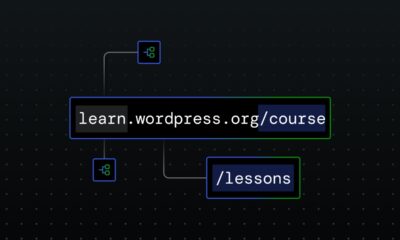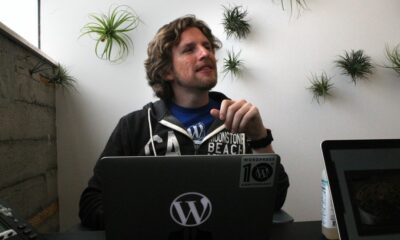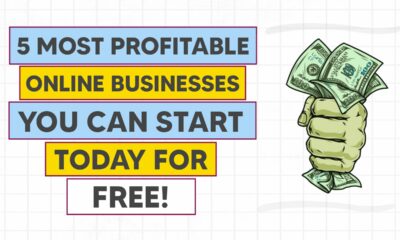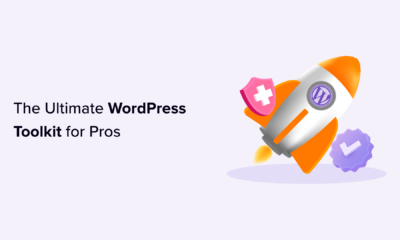SEO
The Future Of WordPress With Josepha Haden Chomphosy

This year, at WordCamp Porto, I had an opportunity to interview Josepha Haden Chomphosy, Executive Directory of WordPress.
She gave us some very in-depth answers about what is happening in the world of WordPress, and what we can expect in the future from the top CMS.
WordPress powers nearly half of the web. What challenges does WordPress face as a CMS in the coming year and how does it plan to overcome them?
Chomphosy: “WordPress in the next year. One of the biggest difficulties we face in general is the fact that we are rewriting our entire codebase as we also continue to move forward as a functioning piece of software.
In a lot of cases, you would see a software stop every contribution from their community and rebuild everything while no one else is in it and just kind of use a closed model of re-envisioning how their software would work.
We are five years into this probably ten-year project and so the next year as with all of the years in a project like that is making sure we are still as stable and capable as a CMS as people have come to expect while also still pushing forward with a newer more modern way to manage your content online.
No big deal, Small problems.”
I know about Matt’s “Five for the Future” initiative which aims to solve the challenges of supporting WordPress as it grows. How do you see that working? Do you see enough response rates from the community?
Chomphosy: “The Five for the Future program initiative has been around since 2014, so quite a while. It wasn’t until 2016 or 2017 that we had a more codified program around it where people could pledge their time to specific teams and those teams would know we have some volunteer work that we can send to people and we can see the people who are interested in doing that kind of contribution.
It funds the project from a time perspective so that it’s easy for individual contributors to say what they are interested in it’s easier for contributor teams to see who is interested in them and recently, we also have expanded that program to include what’s considered a Five for the Future team.
I think that major corporations in the WordPress ecosystem should give back substantially to the WordPress project, especially if they make a substantial amount of money or revenue using WordPress.
Overall I would say that we have had a good response from both our community of contributors and our economic partners in the ecosystem. I do think we’ve had a good response, but we can always use more.
The WordPress CMS is used all over the place and is maintained by less than 1% of the people who get a benefit from that and people in corporations who get a benefit from that and so I always want more people to be involved and responding, but we do have good response to it.”
Do you foresee any changes like WordPress becoming paid, for example?
Chomphosy: “It’s hard to predict the future, but I don’t see any way for that to happen, no.
Free open-source software I’m sure you know but many people get confused about whether that means it’s free as in not any money or free as in provides freedom to people.
We like to remind everyone all the time that it’s free as in freedom to people, but also making the software freely available is incredibly important to WordPress. So I can’t see a future where we’d be like just kidding, pay for licenses.”
What’s going to make WordPress continue to stand out/above its peers and competitors? How is WordPress future-proofing?
Chomphosy: “I think that the thing that makes WordPress as a project stands out from its competitors is the strength of the community that’s around us and interestingly enough the thing that makes our community stand out compared to other open-source projects that also have communities is our in-person event series and so not having those for the last two and a half years certainly has been a struggle for us.
And so this flagship event is the first in-person flagship event since we had to cancel WordCamp Asia in 2020 and we’re very excited to have everyone back together.
There were 800 people at the contributor day and that is the biggest contributor day at a flagship event that we’ve ever had. And so you can see in not only the number of people who are coming to this event but also in the number of people who showed up to learn how to give back to WordPress, the project, the CMS, and the ecosystem. The strength of what we are and how we will sustain ourselves into the future lies in that group of people that just wants to be here and continuing to make it better.
I think that’s how we set ourselves apart and also from a future-proofing standpoint, in the way that we invest in those contributors the way that we bring them into the space and how they can make it better if that’s what they want. I hope that’s what they want. That is certainly how we’re future-proofing things.
A little side note from a leadership perspective. It’s always important for me to look at how we can make sure the organization outlasts anyone who’s leading right now. Outlasts me, outlasts Matt. Because everyone is one just catastrophic event away from not being able to do what they used to do.
That’s always a very important part of this for me. I’m constantly training people who are with us in this work toward WordPress. I’m always training them to do what I know how to do because it’s never appropriate for me to be the only person who knows how to do anything that is vital to WordPress’s success.”
The CMS market becomes competitive day by day. Do you see a decline in WordPress’s market share or it is growing?
Chomphosy: “There was, in the WordPress community recently, a bit of a discussion about W3Tech’s market share and usage numbers. There was a small decline. It’s publicly available and we had discussions around it. There’s no point in saying there wasn’t a decline there.
However, I don’t think that there’s anything to be worried about. With W3Techs, as they are working toward deprecating one of its major datasets, it will always change what we’re seeing there. We can’t be sure what they’re doing and not doing, it’s very closed, very proprietary.
In the grand scheme of things, it’s basically level at the moment as far as I’m concerned there.”
There were complaints from users that WordPress by the introduction of full site editing now does change too frequently and drastically and they now have to spend a lot of time/resources to learn it again and fix broken parts of websites when it was used to work for them just great. What will be your message to those users?
Chomphosy: “I know that it is frustrating to have to relearn something that you spent so much time learning, but that is the way that we have chosen to do that rework of WordPress as kind of a phased evolution over time as opposed to a single point of a revolution was so that people could learn gradually over time based on what they found in small places.
As we make the editing interfaces of the CMS more and more similar they’ll only have to learn they can use the same type of user flow, the same type of interaction pattern across the CMS and so the basic understanding of all of the mechanisms should start to translate into the rest of the CMS as well.
Every open-source software builds everything in public and it is people who are telling us, “This is hard to learn. This is hard for me to use.”
It’s that sort of feedback that helps us to make it better, but it has been for many, many people seeing full site editing right now, a long time since WordPress do such big changes in public, but I wouldn’t say it’s necessarily faster than we expected.
If you’re following the beta and in the plugin, you get a new release in every two weeks, but if you’re not following the beta and the plugin, you get three releases a year and that is, I think, a pretty fast pace, but tolerable as well if you are keeping track as you go.
So I guess my message is to make sure that you don’t just wait until every ten releases to update because then you are going to have a lot that you do to have to learn.”
There are classic editor plugins which is around for those who do want to use the old style of WordPress. Do you think the plugins are going to be maintained for a long time? Do you think you will deprecate them?
Chomphosy: “We have been taking that year by year as we see people’s need for it and as we end up with something much more robust in the CMS itself.
I don’t see any future where we just remove it from the repo or any of the directories. I don’t think we’re planning on deprecating it and having it be gone forever. But it is always better to try to keep up with things as it’s coming out slowly so you are not overwhelmed by all of the things at one go.”
How do you decide what features to ship in new versions? What the process looks like?
Chomphosy: “That’s all a very public process. Fortunately, we get by with a little help from our friends on that one.
So we have core chats every week and every major component most major components inside core have public chats where people talk about the tickets they’re working on, the features they are working on, the bugs they can’t quite solve, and prioritize based on what is the most impactful for users and what is feasible based on the timeframe we’re working on for any given release.
The decision is based on what is ready at that moment, but also certainly but also what the general impact is.”
What is one major fix you would like to see WordPress make?
Chomphosy: “Our next big need is to focus a lot on the menus and navigation, and that is a very complicated thing. That is hard even in the best of moments. No one would disagree that spending a lot of time on that and getting a good solid fix that is user tested and approved is the right way to head next.”
Almost all WordPress users complain about built-in internal search. Do you have plans to improve it? For example giving website owners decide which articles to exclude from search, or adding customizable search indexing weighing factors?
Chomphosy: “The short answer is yes there are thoughts around how to fix it and there is a lot of research that is being done by contributors.
I don’t think that anyone has found a solution that we all agree is as functional as we want it to be while also being as elegant and performant as we need it to be. We have not figured out what the proper solution is to that. But yes absolutely it is something the community discusses frequently and does ongoing research on.”
Gutenberg has Full Site Editing (FSE) but Gutenberg is said to still be in Beta. Is there an ETA for that label coming off?
Chomphosy: “I don’t know that there is an ETA for it coming off. It is true that in the WordPress project we use those terms of it differently just like we do sequential ordering as opposed to semantic versioning.
It’s beta in that it is going to keep moving and iterating, it’s not beta in that it is unstable. It will be in beta at least through the current phase, but not because it’s generally dangerous to use. Just because it will change frequently.”
I think it’s fantastic that WordPress has a performance team working on improving the core so that it has fast performance. But no matter how fast you make the core, it seems like all it takes is a sloppy theme to undo all the good work that the core had put into it. So it seems like the next step is to get theme and plugin developers on board. Is that something on the horizon?
Chomphosy: “Themes are particular. Themes are essentially a core issue.
I have not run into many people in the world, many users in the world who feel like their theme was not WordPress. No one has got WordPress the CMS and then also a theme and they think, “I had a bad experience theme, I’ll switch out that theme.”
I shouldn’t say no one, but regardless, themes are considered such an inextricable part of WordPress that we have to consider them almost as a part of the core sometimes. And so do we want themes and plugins to also make some effort around performance, yes absolutely. But do we have any rules in place at the moment? Not really.
Themes has been undergoing a bit of a transformation along with the core because we have offered new functionality, and we’re trying to reshuffle whether you’ve got functionality or just the visual representations in themes. As that moves forward, probably we will have to move forward with some of the ways we guide all of the contributors.
That’s true for plugins as well as features in plugins kind of move with the way core is able to support them in that it makes sense that we would have to have some sort of refreshed guidelines down the road. But at the moment, no one is discussing them because they’re still trying to figure out how to make everything work well with Gutenberg.”
Do you have plans to introduce badges like WordPress certified? Like team developers can get those by passing a test or an interview process with the WordPress core team got those pages and whenever they are developing have those badges in place so everyone knows that those teams really have skills like the WordPress core team. Like Google Certified Partners, but Certified WordPress Developers.
Chomphosy: “It’s interesting that you ask because questions of certifications are coming up in the community right now. I’ve had so many conversations with attendees at this particular WordCamp. It’s on everyone’s mind.
Historically we’ve never offered any certifications. The logistics of it are hard. The documentation we have is not always easy to keep up to date. There were some logistical hurdles to it, there were some philosophical questions around open source and certifications and what that would mean for how we could help our community stay together with each other through their learning and through improving the CMS.
The conversation has come back up because we have started to provide some training via leran.wordpress.org. It’s getting more and more true that you can get a lot of information that you need about how to use the WordPress CMS not only through written documentation but now also through workshops and social learning spaces.
As we are providing more of that, the question of how we can give some indication that people went through those workshops and went through those training and succeeded at them. So it’s a new old question back on the table.”
The Redirection plugin is installed on over 2 million websites. Clearly, there’s a need for that, so is there any chance that a redirection function similar to the plugin will be integrated into the core and if not, why not? Does it bump up against WP’s goal of keeping it simple for everyone to use?
Chomphosy: “I don’t think that better native features and functionality ever make WordPress hard to use it shouldn’t and if it does we shouldn’t put it in there. But there is currently not a discussion about that.
There is a feature plugin proposal process where people can say that this plugin is basically used everywhere we would like to propose that we find a way for it to be included in core. No one has brought that up. No one has brought that to the table.
I was talking to the performance working group about that yesterday. Not about that particular plugin, but about the feature plugin approval process. The documentation around that needs some updating, but it’s certainly a thing we have always done in the WordPress project and would be the first step in including something like that in the core.”
Conclusion
We hope you’ve enjoyed these insights into the current and future plans for WordPress. Remember that the WordPress project continues to improve based on the contributions of its users. Be sure to learn more about the many ways you can contribute to and give back to the WordPress community.
For more on WordPress from WordCamp Porto, don’t miss our interview with Ivan Popov of Vipe Studio on Headless WordPress SEO.
Featured Image: monticello/Shutterstock



















You must be logged in to post a comment Login